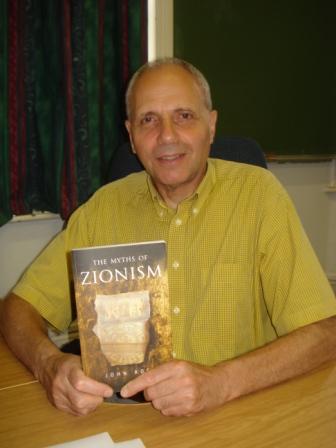
“I’ve always been fascinated by the Middle East, especially the upheavals in Egypt that I believe are a continuation of the revolution that started many years ago,” said Mr John Rose recently during one of a series of discussions that formed part of the 2011 Critical Studies Seminar Series hosted by the Departments of Politics and International Studies and Sociology, entitled The Impact of Egypt's Upheavals on the Middle East Peace Process.
Mr Rose, a Senior Mellon Fellow in the Department of Politics and International Relations on issues relating to the Israel Palestine conflict, delivered two talks, the latter of which was entitled The New Arab Revolution: Contemporary Politics in North Africa and the Middle East. In the series of discussions Mr Rose debated the origins of the current unrest in numerous Arab states, saying that “we are now seeing the effects of treaties and agreements that were signed and enforced many years ago,” and that the charge that Israel is an apartheid-style state is now becoming loud in international media discourse in essence began years ago.
Mr Rose, a leading member of the Socialist Workers Party in England, said the Oslo agreement of 1993, which called for a five-year transitional period in which Israeli forces would withdraw from occupied territories, which did not happen, and a Palestinian authority would be set up, was what 95 percent of people wanted at the time. “There was a collective sigh of relief when it was signed into law on the White House lawn in September 1993,” but Mr Rose said it was, as advocated by leading Palestinian writer and intellectual Edward Said, “in effect an instrument of surrender, a new Versailles. It was similar in terms of the defeat it entrenched among Palestinians to what Germany suffered at the hands of England.”
Mr Rose used this example as an illustration of the complexities of the current political landscape in many Arab states, and said it is necessary to understand the origins of the conflicts. “Although this was a catastrophic surrender the roots actually started earlier with the Israel-Egypt agreement of 1978. We have to go back and understand history in order to understand these issues we are facing now,” he said.
Mr Rose said that many Arab countries felt “very demoralised” with the Israeli victory of the 1948 Arab-Israeli War, which was the first in a series of wars fought between Israel and its Arab neighbours in the long-running Arab-Israeli conflict. “Palestine’s defeat helped fragment the Arab world.” Again, “After the defeat in Vietnam America was looking for proxies to fight American wars on their behalf, and that is exactly what Israel has been doing,” he said.
He further said that the current unrest in Egypt also has roots in contemporary history, in part a response to Egypt’s role as “pawn” for America resulting from the 1978 Agreement. “The new mass democracy movement has been around in different forms for 10 years. There has been unprecedented wide and diverse support for it and it is extremely important,” he said.
In considering the “detonating factor” that triggered the recent uprisings in Egypt, which Mr Rose equates to a form of revolution, he suggested the global economic crisis of 2008. “The rise in world food prices added to the resentment already felt by many individuals in Arab states around the world. The revolution was also fuelled by terror of social-economic exclusion,” he said.
In describing the current uprisings in Egypt as a revolution, he distinguished between two types of revolution, notably social and political, and said it is unclear yet as to which one the Egyptian case will become. “A revolution is a process rather than a set of events with no interconnections. All sorts of pressures are at play and we can’t know for sure which way this will unfold,” he said.
Mr Rose said he does hope that regardless of what form it takes, the United States will stay out of the unfolding events. “It is unlikely that the US understand the complex factors that are involved here. Generally, where America has intervened, they have only made things worse. I hope they will stay out of it,” he said.
He believes the central question posed by the unfolding events is “whether or not this movement can address head-on the failures of capitalism? There is something fundamentally flawed with the system, and I ask whether or not this revolution can revive the left which has always been weak and reorganise productive forces in the interest of everyone and not just in the interest of profit,” he said.
Mr Rose is the author of The Myths of Zionism and Israel: The Hijack State – America’s Watchdog in the Middle East.
By Sarah-Jane Bradfield
Photo: Mr John Rose with his book The Myths of Zionism.
